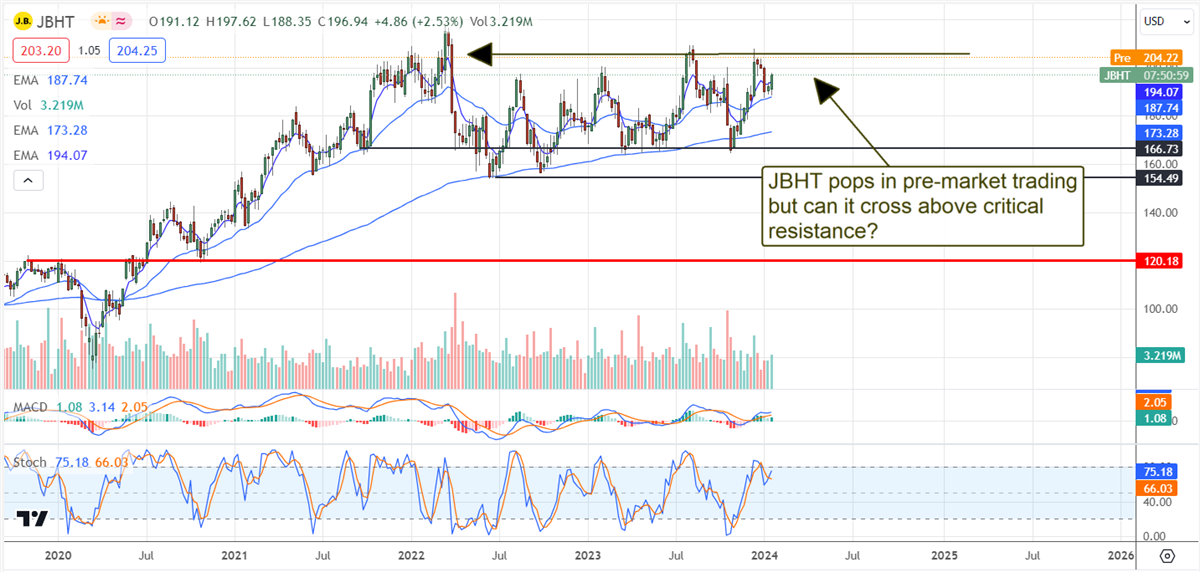
J.B. Hunt Transport Services (NASDAQ: JBHT) struggled in Q4, which will continue in the year's first half, but an inflection point is at hand. The timing of the inflection is uncertain, but volumes are rising in critical segments and are a leading indicator of pricing for the transportation sector.
Volumes rose in the JBI or intermodal segment, supported by increased transcontinental shipments, related at least partly to issues with both significant canals. Traffic is diverting from the Suez Canal because of war and the risk of attack, while traffic in the Panama Canal is impacted by drought. Ship crossings are reported to be down 36% YOY at the Panama Canal because of low water and all that freight has to get across somehow. Drought conditions are not expected to improve soon, and war in the Middle East seems to be escalating.
The takeaway is that J.B. Hunt is navigating the challenging environment well enough, and the outlook has greatly improved. The company doesn’t give specific guidance for revenue and earnings, but the expected increase in tax rate foreshadows improved profits, aligning with the analysts' forecasts. A consensus of twenty analysts forecasts top and bottom-line growth returns this fiscal year and accelerates into 2025, supporting the outlook for shareholder value and capital returns.
J.B. Hunt struggles in Q4; to focus on operational quality in 2024
J.B. Hunt had a mixed quarter, with volume increases more than offset by yield pressure and rising costs. The company reported $3.3 billion in net revenue for a decline of 9.6% but outpaced consensus by $30 million. The primary area of weakness is in pricing. Realized pricing fell 10% to 15% across segments and was compounded by volume declines in some. JBI, the intermodal segment, is one of the areas of strength where volume increased by 7%, underpinned by a 13% increase in transcontinental. Assuming that volume remains solid, pricing should increase and improve the revenue and margin.
The margin was an area of weakness in Q4 but was offset by hopes that a rebound would form. The company’s margin contracted more than expected due to yield pressures and rising costs that include higher insurance claims. The takeaway is that Q4 and FY cash flow remain solid, with the quarterly take positive despite an increase in CAPEX. CAPEX focuses on improving fleet size and quality, shifting consumers to intermodal and operational efficiency, which all play into the 2024 outlook.
J.B. Hunt will deliver for shareholders in 2024
As tepid as the Q4 results are, the company’s cash flow and balance sheet are sufficient to sustain the capital return outlook, including dividends and share repurchases. The company raised its dividend by 2% with the Q4 release aligning with expectations. The new payout annualizes to 0.85%, which is small but compounded by safety and repurchases. Regarding distribution safety, the company pays less than 25% of its earnings as dividends, has very low leverage, and has an unencumbered balance sheet with ample coverage.
Repurchases aren’t enormous but are sustainable at their current levels. Repurchases in Q4 amounted to $25 million or 0.12% of the market cap, leaving $392 million under the current authorization. The share count is down 0.5% YOY and should continue to decline over the next four quarters.
J.B. Hunt on the road to new highs; analysts are in the driver's seat
J.B. Hunt shares are on track to reach new highs and are up more than 4% in premarket trading, but there is a hurdle. The market is trading in a way that is aligned with the analysts' consensus, which may provide a ceiling. The upshot is that sentiment has warmed over the last six months, and the 2024 revisions are positive. The high target was set in December but is in play with price action rising and the consensus price target edging higher ahead of the report. It suggests the market will move 10% above the current high. J.B. Hunt shares should be able to break resistance and set a new high if this trend continues.






